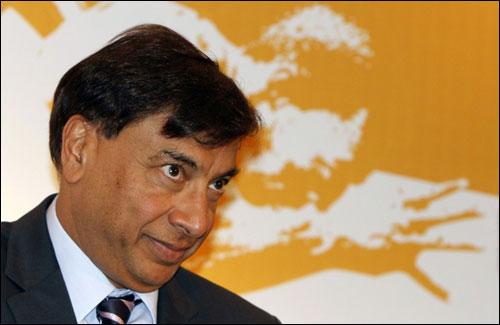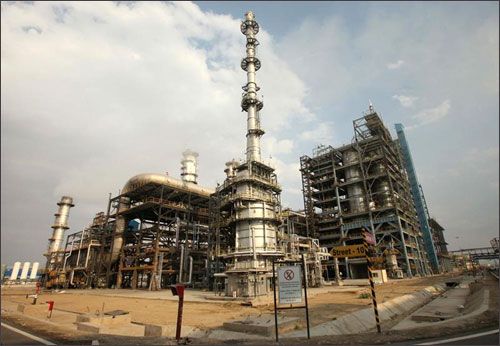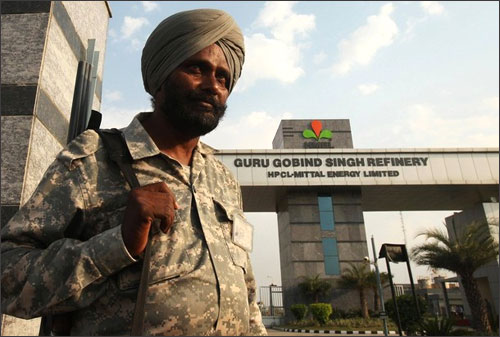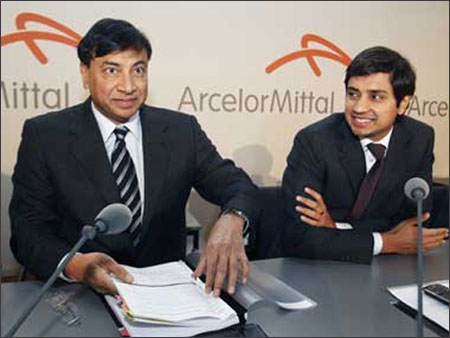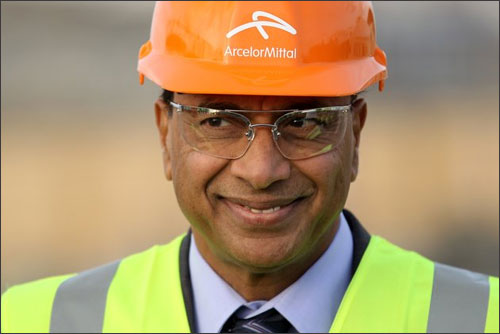 | « Back to article | Print this article |
Whatever may happen in politics, India will grow: Lakshmi Mittal
A day after he inaugurated the Bathinda oil refinery, his first project in India, Indian-born steel tycoon Lakshmi Niwas Mittal, 62, had a media interaction in the capital. The second richest Indian said he felt bad about the delays his projects faced in his country. The refinery, he said, was testimony to his commitment to India even as the country remained low on his investment list, owing to slow progress. Excerpts reported by Ajay Modi:
After Bathinda, what are your next focus areas in oil and gas?
HMEL (Hindustan Mittal Energy Ltd) is a platform for us to grow in exploration and production. We should not jump too fast. We should not set our goals too high.
We have to make a space and position for HMEL by product delivery and quality. Unless this foundation is perfect, any further investment will have difficulty. The current project needs to stabilise, earn profits and returns. Once it starts doing so, we are here to stay.
Is energy part of your strategy to offset the cyclical nature of steel?
Energy is no less cyclical. Except for IT, I see more and more business becoming cyclical. In spite of its cyclical nature, steel production is growing at over four per cent globally.
Click on NEXT for more...
Whatever may happen in politics, India will grow: Lakshmi Mittal
HPCL had already got the land before you came in and thereafter things moved rapidly. In your mega projects where you are doing things single-handedly, things are taking time. Do you think the partnership route with a public or a private Indian company is better?
When we joined this project, we just had a piece of land. That was not enough. Moreover, this project was lying dead for long and this acted as another handicap. What I want to say here is that one formula cannot apply to all projects. Every project will have its own set of problems and we have to address them.
In my steel project I am dealing with individual states but in this project I had to deal with three states and thousands of people for laying the 1,017-km crude oil pipeline. It was a difficult task when states knew we were laying pipelines in their area but the project was not coming up in that state.
Given the success of this project, are you open to public-private partnerships for your other projects as well?
A partnership, public-private or private-private, does not make a difference.
As long as the partners are aligned together and have the same mindset and agenda, things work; like it happens in a marriage.
Click on NEXT for more...
Whatever may happen in politics, India will grow: Lakshmi Mittal
One of your marriages with OVL did not take off. With Bathinda, can we say your interests are renewed?
Any partnership is like exploring a relationship. If it does not work, it does not work. It does not shift my agenda. You work for 10 projects, a few succeed and a few don't.
This does not become the prerogative of my future direction or future success or failure. The partnership with OVL is not over but there are not many projects where we can work.
We and OVL had an MoU with the Nigerian government for exploration and refining, etc. The two blocks we got and drilled were not economically viable.
You are the second Indian mining firm after Vedanta to focus on energy in India. Is energy a more lucrative and certain investment?
Our country has huge requirements, be it in steel, mining, energy, IT or consumer goods. We are a growing economy like China 20 years back. Our company has and will have focus on mining as well as energy.
Click on NEXT for more...
Whatever may happen in politics, India will grow: Lakshmi Mittal
Do you see India reaching the same level as China in 20 years?
It is a very difficult question. Our benchmark should not be China, it should be the US. China's benchmark is not India. Why should our benchmark be China?
Our strengths are very different. We have a very young group which is more than 50 per cent of the population. The developed world, including Europe, should be our benchmark.
Do you see more and more Indian companies doing mergers and acquisitions in the US or Europe?
I do not even think on such lines. To me, M&A is not driven by country; it is driven by your business. I never chose to go in a country because everybody was flocking there. I will go to a country if my business takes me there.
Has ArcelorMittal slowed down its investments in India?
We are not seeing the progress we would have liked. Our commitment to India remains and the Bathinda refinery is a testimony. If the stage is set right, things can progress. Our refinery is built through a public-private partnership, which people perceive to be an extra hindrance.
Whatever may happen in politics, India will grow: Lakshmi Mittal
Where does India figure in ArcelorMittal's global ambition?
India is clearly high in our priority list but it is low in our investment list. It depends on the progress of projects and investments move up or down with the speed of progress. Every three months we have a discussion on allocating capital. Capital is scarce.
How do you react to the low progress in India? For how long are you ready to wait for such projects which have not progressed in more than five years?
The process of securing approvals is going on. However, the pace is low here. My people are spending a lot of time here. I am unhappy about it. I feel bad but we are not giving up. But where you cannot control, you have another opportunity.
Indian projects are one of the several projects for us. If approvals don't come, capital allocation won't follow. We have a rigorous capital allocation system.
Is it the problem with overseas companies like ArcelorMittal and Posco? Domestic companies like Tata Steel seem to get things done faster.
Brownfield expansions are easier than greenfield, as fewer approvals are required. Companies like Tata can continue to grow and it will be a much easier task than starting from greenfield. If I had to start this refinery greenfield in Orissa or Karnataka, I do not think we would have made such fast progress.
Click on NEXT for more...
Whatever may happen in politics, India will grow: Lakshmi Mittal
There is a controversy on the usage of natural resources and their allocation. Should natural resources be auctioned or given away?
I have never been given anything in my life and I have always worked to get everything. Why should anything be given away? At the same time, there has to be a transparent and equitable system.
How do you view the recent cut in India's long-term outlook by S&P?
The India story is definitely not over. We are in the process of continuous growth. India has tremendous potential to grow. The middle class is growing and the country has the great advantage of a young and aspiring population. India is surely impacted by global crises.
Before the 2008 crisis, everyone thought India was decoupled from the global economy but the crisis showed we were not. This is one reason behind the slow growth in the last one year.
The European economy is affecting us. But even a growth of seven per cent is better than most of the world. While we should continue to strive for a much higher growth rate, we should neither be contented nor think the India growth story is over.
Whatever may happen in terms of politics or you may call it a paralysis, the country will grow. I am very positive about it.
